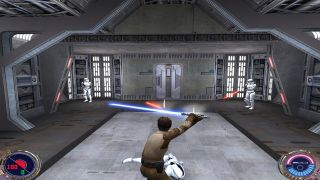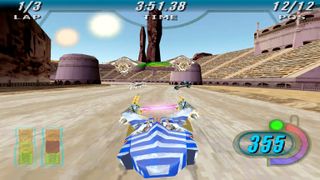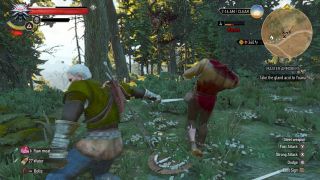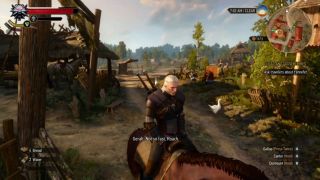Port Masters: inside the studios responsible for keeping your favorite games alive
For over two decades these devs have been perfecting the art of the game port

More so than previous years, 2020 represents a time when everything old is new again. A fact that’s especially true for games. Major AAA publishers like Activision, EA and Square Enix appear all too happy to feed players’ nostalgia by way of total remakes or lightly-touched remasters, simply because repackaging an older game people already have a built-in fondness for tends to be less costly. It can also go a long way to fill the space in between new, blockbuster titles releasing.
This reliance on remakes and remasters is now being emphasized more than ever. However, another common route publishers can take is porting, which refers to a process that can be as simple as getting one game running on a platform it originally wasn’t intended for, all the way up to an aforementioned remaster that touts overhauled visuals and new quality-of-life features.
With ports having so much wiggle room, we thought it worth speaking to the teams behind them. And though you might think developing a game entirely from scratch is difficult, the act of adapting someone else’s work for a modern audience can be equally taxing.
A galaxy playable for all

"It's a challenge to bring a game based on old technology to current standards," says Elizabeth Howard, VP of publishing at Aspyr Media. "[To] ensure the feel doesn't get lost in translation or takes away from the overall experience that players are expecting."
A Texan game studio with over two decades’ development and publishing experience, Aspyr was founded with the explicit intention to port popular games to Mac – a feat that eventually led it to own 60% of the Mac entertainment market by 2004. Since then, the studio continued to expand its partnerships and started porting games to other platforms. Odds are if you played Guitar Hero on PC or Sid Meier’s Civilization on Linux, these were the folks behind it.
"It's a challenge to bring a game based on old technology to current standards."
Elizabeth Howard- Aspyr Media
One relationship that’s been there almost from the very beginning, however, related to the now defunct LucasArts. "Aspyr has a long history of working with top-rated games for the Star Wars franchise, bringing them to new platforms for even more fans to enjoy," Howard explains. "Over the course of Aspyr’s history we’ve worked on more than 10 Star Wars games. This includes Star Wars: Knights of the Old Republic, Star Wars: Empire at War, LEGO Star Wars: The Video Game, Star Wars: The Force Unleashed: Ultimate Sith Edition, and Star Wars Battlefront."
Such familiarity placed Aspyr in prime position to port and remaster certain Star Wars games that were previously thought lost to the ether following Disney’s acquisition of the license in 2012. The House of Mouse simply didn’t look to be respecting what it now deems ‘Legends’ media at first, but now thanks to Aspyr we’ve seen classic titles like Jedi Outcast, Jedi Academy and most recently the much-beloved Star Wars Episode I: Racer come to PS4 and Nintendo Switch.
Get daily insight, inspiration and deals in your inbox
Get the hottest deals available in your inbox plus news, reviews, opinion, analysis and more from the TechRadar team.
Risk vs reward

But what’s considered the best approach for porting games that are now 20+ years old to new systems? There’s almost never a ‘one size fits all’ solution, as Howard reveals: "With every project, tough decisions are made and planning is done so that any change, whether taking something away or adding a feature, will truly benefit the game and player."
This is to say that the desired outcome for any port is to recapture the feeling of the original while ironing out any technical glitches that could potentially arise. Many of the classic games Aspyr remasters, for example, weren’t developed with widescreen in mind. Couple this with other risk factors like how the game’s UI will translate, whether the original source code is available to work from and if the licensed soundtrack must be renewed, and what you have is a potential minefield of problem solving needing to be overcome by the port studio. Howard suggests it’s all worth it, if only to ensure "that the game stays true to the brand".
"I would say going through the experience of porting The Witcher 3 has made things easier for us in terms of doing Switch ports."
Matthew Karch - Saber Interactive CEO
This idea of ‘staying true’ is a concept that any determined developer should consider when porting games to another platform. But while bringing classic games back from the dead (as in Aspyr’s case) means you’re battling with the rose-tinted eyesight of players, porting over modern games suddenly sees you competing with other contemporary versions of the same product. Having worked on popular ports of World War Z, Vampyr, Ghostbusters: The Video Game – Remastered and more, this is a task developer Saber Interactive knows all too well.
In an era where frame rates, draw distances and general graphical fidelity come under scrutiny amongst a select subset of detail-oriented players, Saber has still managed to impress with its ports on a technical level – most made evident by its work with Nintendo Switch. The primary example of this being The Witcher 3: Wild Hunt Complete Edition, which overcame the odds to enable players to take CD Projekt Red’s open-world magnum opus on the go.
"Since the release of The Witcher 3 on Switch, we’ve become somewhat well known for Switch ports," chuckles Saber Interactive CEO Matthew Karch. "Which is amusing because we have such a long history and variety of projects." Released only last year, this Switch version includes the base game and all DLC. This forced Saber to make certain concessions from a visual standpoint, yes, though it still absolutely looks and plays much like its home console counterparts.
Karch acknowledges that Switcher – as players have taken to calling it – was "the most challenging port we’ve ever worked on", but is confident that Saber has now solved lessons it can pass onto other studios interested in porting to Nintendo’s hybrid platform. "I would say going through the experience of porting The Witcher 3 has made things easier for us in terms of doing Switch ports," he continues. "As pretty much any challenge to do with the limitations of the platform have already been faced."
The A Team

But just how big of a difference is there in porting something modern like The Witcher 3, as opposed to a slightly older title like Ghostbusters: The Video Game?
"Sometimes we are handed code with little guidance, and we just have to figure it out. That can be an interesting challenge… or a nightmare."
Matthew Karch - Saber Interactive CEO
Age, as it turns out, plays a more crucial role than one might think. As does not being able to directly work with the original team, which is a common occurrence when key developers are separated and studios have long since been dissolved.
"It’s ideal when most of the original development team is still intact," admits Karch. "They know where the bodies are buried, so to speak. But sometimes we are handed code with little guidance, and we just have to figure it out. That can be an interesting challenge… or a nightmare."
Luckily, in The Witcher 3’s case, Karch and his team could maintain a close relationship with CDProjektRed, no doubt helped by the fact that Saber Interactive’s Russian’s studio lay near Poland. Regardless, it pays for a port studio to be adaptable.
Passion breeds success

Above all else, when it comes to choosing which games to port, demand is obviously important but both Aspyr and Saber agree that passion is also key to success. "Everyone at Aspyr is a huge Star Wars fan," Howard reveals. "We love being able to bring Star Wars games to new audiences. For us, it’s all about the games we think players are most passionate about and would love to see brought to new platforms." Karch concurs: "For us to take on a port project these days, it needs to be one we’re keenly interested in".
This passion is one clearly being matched by modern audiences with a thirst for increased game access across all platforms and generations – two aspects that studios who specialize in porting happen to know a lot about. And as more practices like Smart Delivery, video game remakes and backwards compatibility only continue to be discussed, you can be sure that there will always be teams primed to render new and classic games in the best light possible.
- Best Nintendo Switch games: the most essential Switch releases
